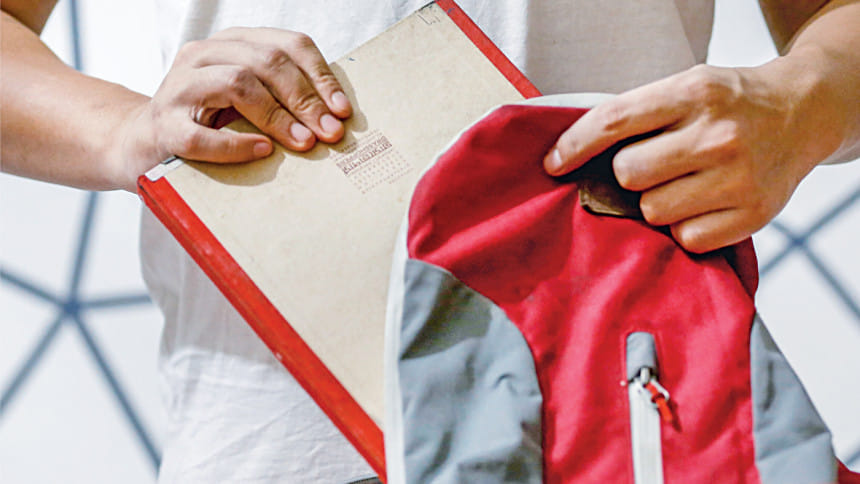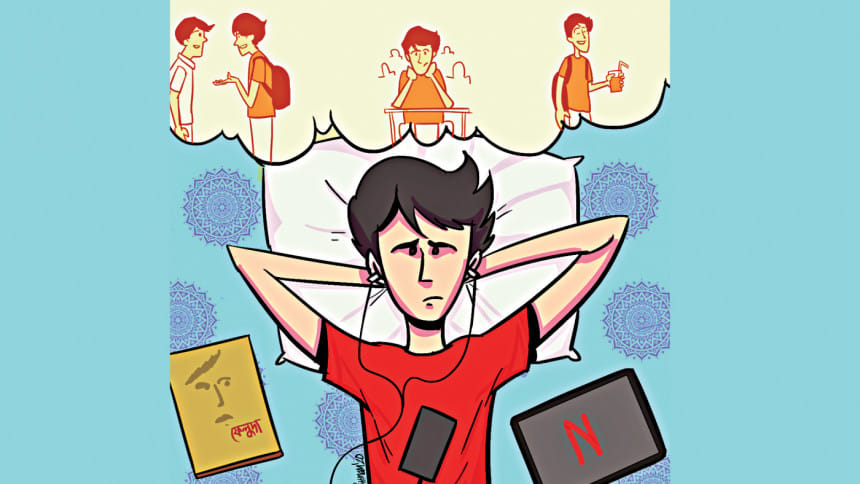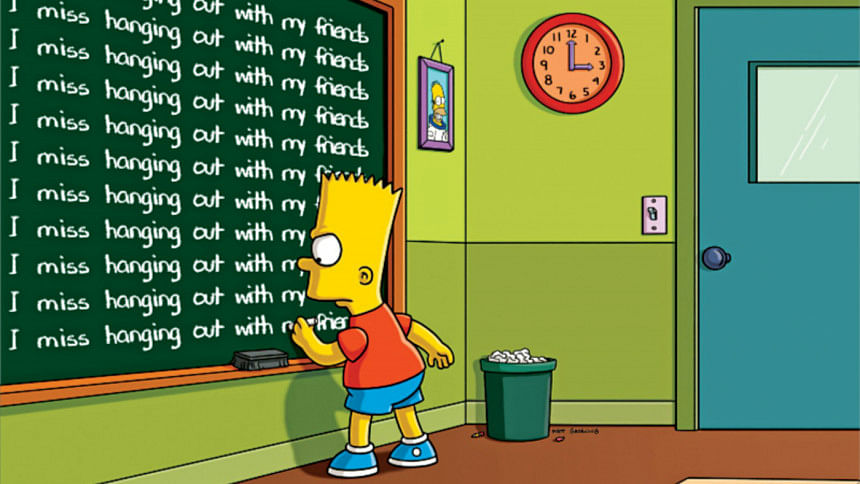Education 101: The New Normal?

As coronavirus cases soar across the country battering the conventions of a "normal" life for many, those with enough privilege have to make do with being cooped up in the confines of their homes. And students are left with no option but to do their classes and assignments from home.
While that is a predicament varying in degrees for various age groups, freshmen—who just started university late last year or this year on a hopeful note—have to grapple with this seismic shift in a wobbly manner. After all, freshman year is when students expect to navigate through the untouched terrains of a new environment and educational system. It is also considered a time when academic pressure is the least as compared with the remaining years of a university education.
"Like any other university freshman, I too, was excited for this new chapter of my life. I was looking forward to making new friends and observing the world through a new lens. But since the pandemic started, all those desires started to seem far-fetched. Doing online courses and engaging in extracurricular activities may seem like an escape plan from boredom, but that can never measure up to the stuff we could be learning while traveling around. I feel like we are missing out on one of the most happening phases of our lives," says Kamil Jalal*, a BBA student from IBA, Dhaka University, about missing out on all the expected freshman experiences.

"Usually, freshman year is the most lenient in terms of academics. This is when people get the chance to be devote time to clubs and extracurricular activities, to creating lifelong friendships," says Farhan Ahmed*, a first-year student from Islamic University of Technology in Gazipur.
According to Labonno Hayat, a fresher at Bangladesh University of Professionals (BUP) , gathering new experiences in that first year is crucial to learning the ropes of adjusting to university life so that the remaining years flow smoothly. But now, that seems somewhat distant.
"I do feel like I'm missing out on opportunities to join clubs and to make friends, both of which could be integral parts of university life," states Fatima Jahan Ena, a first-year North South University (NSU) student, in this regard.
For students who were supposed to start university in Summer 2020 semester (or after), the excitement of starting university seems to have been dampened by the unrelenting situation.
Syed Khan*, a student already lagging behind a semester, was supposed to enter university in the summer session. However, the admission tests got delayed twice. For students like him, the enduring period of uncertainty is proving bothersome, although he tells me that the sense of solidarity is reassuring.
"So far it's been the fear of lagging behind while my friends have already completed a semester elsewhere and I still haven't begun university," says another student, Samiha Islam from BRAC University. Students like her, she says, have been staying at home for almost a year and the current situation has made it more exasperating.
"It would be nothing like sitting in an actual university class. One of the benefits of a Liberal Arts education that I was looking forward to was building a personal connection with my professors, something that online classes are never going to be able to offer. With that in mind, and other logistical difficulties in obtaining a visa, I'd rather start university at a later time with less uncertainty than start university at home," says a Sima Shamsie*, who was bound for Dickinson College in Pennsylvania, USA this August but chose to defer their enrolment to January.
Many students and teachers believe that while digitalisation is a necessity in other aspects of an education, it cannot fully be the norm.
Regarding the sudden and hurried digitalisation of education, Sajid Hossain*, a lecturer of Philosophy at a public university, opines that the most important thing he misses in online class is eye contact with students. "It gives me the signal how you are impressed with new ideas. Another thing I miss is vivid interaction regarding a topic. There are arguments and counter arguments in real class. But online, I hardly find it," he comments.
Shaila Solaiman, an Assistant Professor at Bangladesh University of Professionals, states that online teaching is not the same as classroom teaching. "No eye contact means I can't read their facial expressions. A physical classroom environment is more effective than online learning. Moreover, things like the lack of mental preparations of students, poor internet connection, lack of equal access to the internet and of reading materials exist," she tells us.

Shiropa Shahreen, a freshman student at The College of Wooster, USA, thinks that even though professors try their best to help and are very lenient with everything, she does not do well without an in-class setting. "If next semester continues to be online as well, I know I'll be struggling," she mentions. "I personally learn better with someone explaining things to me rather than learning from reading myself. I also prefer studying in a group, which I can't really with online classes."
Besides, the digitalisation of education also illuminates the matters of income inequality and varying degrees of socioeconomic conditions across different households. Although a country-specific report on how online education is contributing to the disparity in accessing opportunities is yet to come, one report by Vox suggests that the shift to online learning could worsen educational inequality.
According to an article focused on the scene in Khulna, disadvantaged students from remote areas or even in the city are missing out on online class because of having no access to digital devices. Abdul Huq*, a freshman from a public university, told us that being in a middle-class family, they couldn't buy a computer or laptop immediately after joining classes. As a result, attending classes and completing assignments seem nightmarish to them. They had to borrow a laptop to complete their university work. "Income sources are squeezed in every sector. My father lost his job two days back, and although I am not pressurised financially yet, I am worried," the student expresses.
Among other pressing issues that staying home in this period of inactivity and stillness for a long period invites are those related to mental health. An article by The Guardian suggests that the lockdown is taking a toll on mental health, since it is depriving people of their regular routines and social engagements. For students, this challenge can affect how they perform academically. Labonno, from BUP, says, "Mentally, I am at my most vulnerable place right now. My concentration level has dropped and it is traumatising. The depression that I have been fighting for long was going away because I could involve myself physically in things. The pandemic stopped that opportunity, putting me on stop like the old days."
"I think a lot of us are suffering (in varying degrees) because of our universities adapting to this drastic change. There's been a lot of confusion and stress about what parts of our curriculum will be assessed. Recently they added the requirement of final assessment assignments which could have been avoided if the student body had opted for alternatives. All of this combined with the mental strain of coping during a pandemic has taken a toll on mental health in general," Fatima from NSU says about the challenges she faces.

While first-year students are having to grapple with the complexities of a rocky start, those who are yet to sit for their HSC exams and university admission tests are gripped by an overwhelming unease.
Mirza Raqib*, an HSC candidate from Notre Dame College, tells me that they are unsure of the exam date and the probable routine. "Many students have lost their rhythm, including myself, and forgotten a lot of things they had prepared for. I'm worried about how stressful it is going to be in late September (everyone is marking September as a probable time) because we will have finished our HSC exams by then and have to sit for university admission tests with a preparation of only 30 to 40 days," he concludes.
With no solid, logical reassurance in sight, recently admitted university students and the prospective ones are having to see their expectations cut short.
*Names have been changed for privacy
References
1. Vox (April 9,2020). The shift to online learning could worsen educational inequality.
2. The Guardian (April 30, 2020). Mental health suffers under the lockdown.
3. Dhaka Tribune (May 15, 2020). Poor students miss out on digital education in Khulna.
Shah Tazrian Ashrafi is a writer and a freshman at Bangladesh University of Professionals.

 For all latest news, follow The Daily Star's Google News channel.
For all latest news, follow The Daily Star's Google News channel. 



Comments